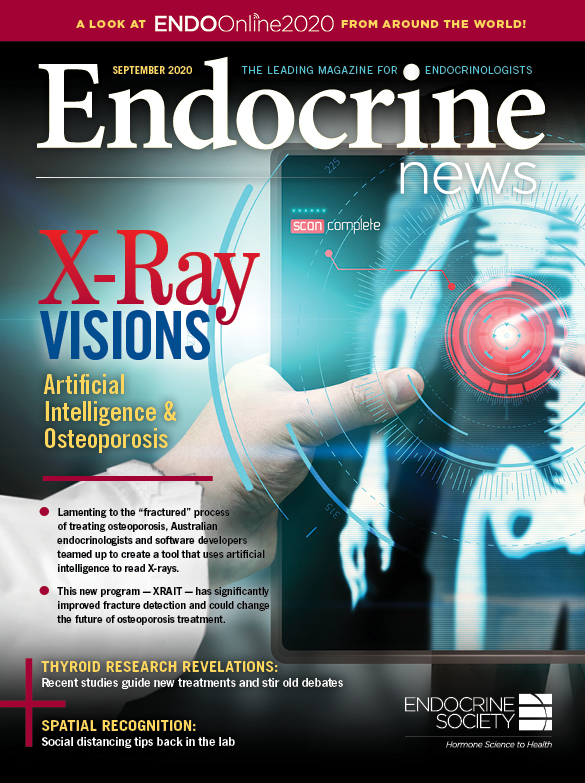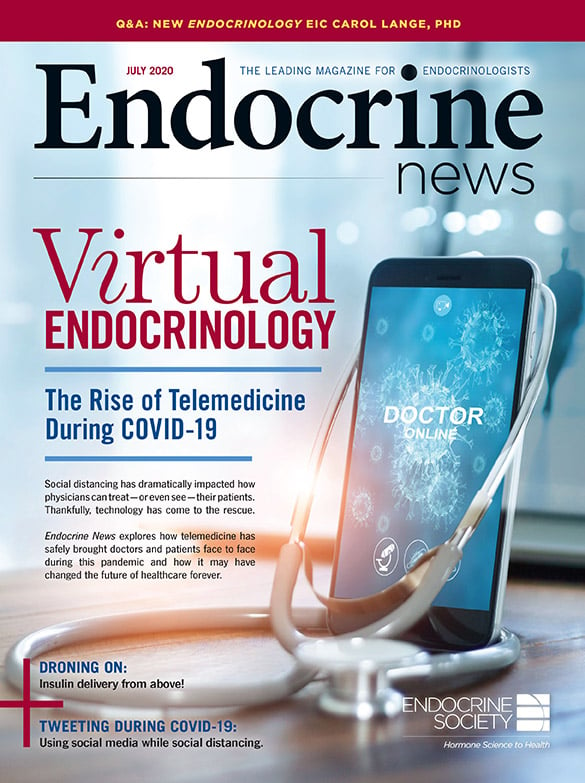Teamwork is often vital to improving patient outcomes. And while most healthcare professionals are in favor of working together, the biggest obstacle appears to be simply finding the time to team up. In a survey conducted last summer by the market research and analytics company The Harris Poll for Boehringer Ingelheim and Eli Lilly and...
New Integrated Data Show Promise for Novel Thyroid Eye Disease Drug
New pooled data from Phase 2 and Phase 3 clinical trials further reinforce that teprotumumab-trbw significantly improves proptosis (eye bulging) and diplopia (double vision) for thyroid eye disease (TED) in patients in different subgroups, with most maintaining a long-term response. The results were published recently in The Lancet Diabetes & Endocrinology. Teprotumumab-trbw is a fully human...
Many Endocrine Patients and Providers Want to Continue Telehealth After Pandemic
Three in four patients say telehealth quality of care is similar to in-person visits Two-thirds of patients with chronic endocrine health problems who need close monitoring say they would like to continue with telemedicine follow-up visits after the COVID-19 pandemic ends, according to a survey presented virtually at ENDO 2021. Three-quarters of providers also said...
Sleep disruptions, poor eating habits, lack of exercise, and general malaise can all be a part of those on call hours for every clinician. Endocrine News spoke to a few experts for their advice on simple ways to combat the ill effects of being on call. Being on call — working after hours to...
Insulin Titration Software Combined with CGM Enables Patients with Diabetes to Improve Time in Range
First study to utilize CGM data with FDA-cleared, cloud-based titration software suggests significantly improved outcomes for patients while optimizing clinical resources This past summer, Glytec published the first proof-of-concept study that combines FDA-cleared remote insulin titration software and data from continuous glucose monitoring (CGM) systems. Results of the study, presented at the American Diabetes Association’s...
Dexcom last month announced it has signed a five-year collaboration agreement with the University of Virginia to advance its research and development efforts on continuous glucose monitoring-based solutions. The research partnership will center on advancing Dexcom’s automated insulin delivery technology and exploring the use of continuous glucose monitoring tools outside the type 1 diabetes market,...
 Due to the “fractured” process of treating osteoporosis, Australian researchers and software developers teamed up to create a tool that uses artificial intelligence to read X-rays. The new program —XRAIT — has significantly improved fracture detection and could change the future of osteoporosis treatment. Christopher White, MBBS, PhD, FRACP, an endocrinologist at Prince of Wales...
Due to the “fractured” process of treating osteoporosis, Australian researchers and software developers teamed up to create a tool that uses artificial intelligence to read X-rays. The new program —XRAIT — has significantly improved fracture detection and could change the future of osteoporosis treatment. Christopher White, MBBS, PhD, FRACP, an endocrinologist at Prince of Wales...Virtual Endocrinology: The Rise of Telemedicine During COVID-19
 How clinicians treat patients has been drastically reimagined during the COVID-19 pandemic due to social distancing requirements. Since patients still need to see their doctors one way or another, telemedicine has filled the gap and has been embraced by both the healthcare community and patients alike. Chirag R. Kapadia, MD, is an endocrinologist at Phoenix...
How clinicians treat patients has been drastically reimagined during the COVID-19 pandemic due to social distancing requirements. Since patients still need to see their doctors one way or another, telemedicine has filled the gap and has been embraced by both the healthcare community and patients alike. Chirag R. Kapadia, MD, is an endocrinologist at Phoenix...
